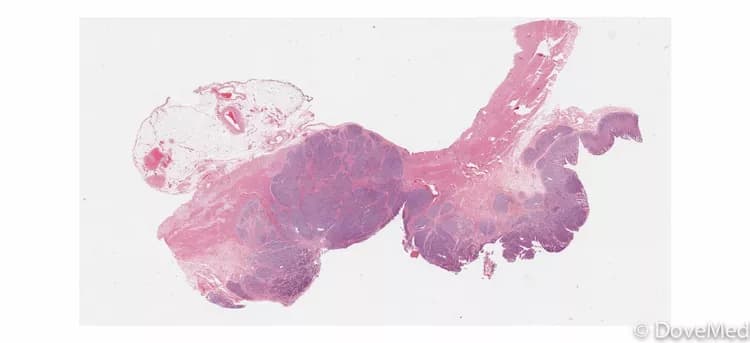
Large Cell Neuroendocrine Carcinoma of the Urinary Bladder
What are the other Names for this Condition? (Also known as/Synonyms)
- Large Cell Neuroendocrine Carcinoma of the Bladder
- LCNEC of the Bladder
- LCNEC of the Urinary Bladder
What is Large Cell Neuroendocrine Carcinoma of the Urinary Bladder? (Definition/Background Information)
- Large Cell Neuroendocrine Carcinoma (LCNEC) of the Urinary Bladder is a rare high-grade neuroendocrine tumor that is seen in the urinary tract
- Neuroendocrine tumors (NETs) are tumors showing neuroendocrine differentiation
Incidence:
- LCNEC of the Urinary Bladder is an exceedingly rare tumor; less than 40 Primary Bladder LCNECs have been in the literature so far
- A vast majority of cases are noted in adults
- Both males and females are affected
- All races and ethnic groups are at risk
Risk factors: The risk factors for Large Cell Neuroendocrine Carcinoma of the Urinary Bladder are presently unknown.
Cause: The cause of tumor formation is presently unknown.
Signs and symptoms:
- The tumors can arise in a variety of anatomical locations including the urinary bladder
- Blood in urine is a common symptom
- Bladder tumors are typically between 1-9 cm in size
Diagnosis:
- Blood and urine tests
- Radiological studies
- Ultrasound of abdomen
- CT and MRI scan of abdomen
- Tissue biopsy of the tumor is important to arrive at a definitive diagnosis
Complications:
- Emotional stress
- Tumor metastasis to different organs and regions
- Incomplete removal resulting in tumor recurrence
Treatment:
- The staging is based on American Joint Committee on Cancer (AJCC) classification
- Treatment depends on cancer stage and health of the individual
- It may require a combination of surgery, chemotherapy, and radiation therapy
Prevention: Presently, it is not possible to prevent the formation of Large Cell Neuroendocrine Carcinoma of the Urinary Bladder.
Prognosis:
- The prognosis depends on the stage of the tumor
- These tumors are typically high grade and have a poor prognosis
- Overall median survival for Bladder LCNEC is less than 1 year
Related Articles
Test Your Knowledge
Asked by users
Related Centers
Related Specialties
Related Physicians
Related Procedures
Related Resources
Join DoveHubs
and connect with fellow professionals

0 Comments
Please log in to post a comment.